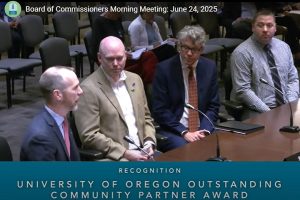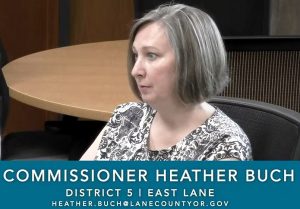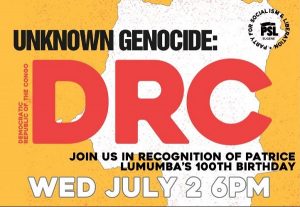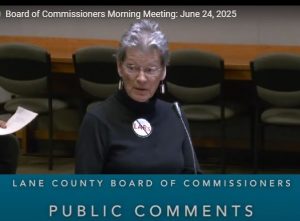Recall rallies hope for stopping ‘EmptyX’ diesel buses on River Road
13 min read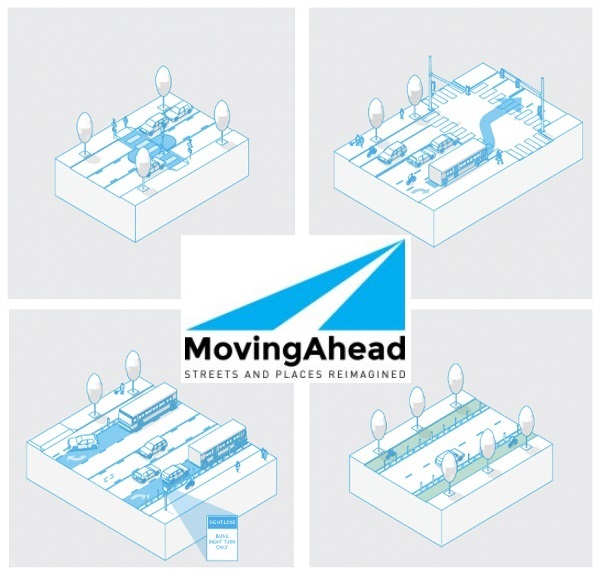
At the all-neighborhood transportation meeting in August, citizen frustration with business as usual may lead to the first city council recall in Eugene history. Speaking out against reserved bus lanes on River Road, Janet Ayres:
[00:00:13] Janet Ayres: I frequently go north on River Road and I think it’s just going to present additional traffic issues. We already have problems up at the north end of River Road, the exchange there, you try going through there at rush hour and with the buses there and their station going to be centered there. And you get behind a diesel bus. It’s a known carcinogenic.
[00:00:40] So I’m not looking forward to a more congested River Road. We’re going to have River Road so busy, it is just going to be a nightmare to travel on. And so I think that they certainly need to go back to the drawing table and start fresh.
[00:00:58] Natalie Crowder: As I’ve gone around and I’ve gathered signatures and I’ve talked to the people on River Road, people have not known about this. We’ve been in the dark. We have not been told.
[00:01:09] But I do feel that this recall for Claire has brought clarity to many people out here that maybe we can stop it.
[00:01:20] You know, to reduce lanes on River Road— as I stand out there four hours today— would be insane to do that. We do not need that.
[00:01:30] We’ve been out there a couple days. We’ve gotten lots of positive reinforcement that we’re doing the right thing. People have called out and said, ‘Yes, we voted and we are ready for recall.’
[00:01:45] John Crowder: I talked to a city planner today, I asked him who owns River Road. And he said it’s a hodgepodge. There are sections that are by the county, there are sections by the city, and then I believe the interchange is owned by the state of Oregon. So it’s almost like the left hand doesn’t know what the right hand’s doing.
[00:02:06] I think that the Beltline – River Road intersection is probably the busiest intersection in all of Eugene.
[00:02:12] Council members need to come out and be there from 4:00 to 5:30 (p.m.) and see what a train wreck it would be if they do anything to restrict the traffic. So yes, something needs to be done, but EmX is not the solution.
See also: An opposing view
[00:02:28] Meta Maxwell: As you know, we gathered over 464 petitions against MovingAhead, including over 150 that were from people in Ward Seven and close to River Road. We turned in all of those signatures to them before the vote and Claire Syrett still voted to advance the MovingAhead project, which would remove the two lanes for cars, remove 132 medium and large size trees, put in miles of CO2 concrete and run big diesel buses. Right now, River Road— and I spent many evenings there at rush hours— most of the buses run near empty. Charlie, you live on River Road.
[00:03:15] Charlie Rojas: I would ride the bus three days a week, twice a day, six times a week. We called it the EmptyX. It has been a failure. It simply cannot sustain itself. It doesn’t provide any of the promises that the boosters, when they came up with the idea of the EmX maybe 20 years ago— when they first promoted this— none of those promises have been fulfilled and it’s a failed system.
[00:03:39] Everything’s predicated on ridership. At some point in time, somebody in the city, LTD board of directors, the city council, somebody should have said, ‘Well, what are the numbers? Can we figure out whether or not this is efficacious?’ And guess what? Nobody bothered to do that.
[00:03:56] Krista Rojas: Well, we finally got numbers. This is Krista. We finally got numbers from LTD on the ridership before the pandemic for West 11th, and the numbers showed it never got more than half of the ridership it had promised. So it was an obvious failure.
[00:04:17] It doesn’t work in the snow. It’s a more expensive bus. It doesn’t last as long. So even just the basic numbers for the bus system itself were ridiculous.
[00:04:30] None of that has been discussed in the objections to our recall efforts, which are not only about the bus. It’s also about all the subsidized unaffordable housing, much of it owned by out-of-state or out-of-country folks. So the rents that we’re subsidizing don’t even stay in our community.
[00:04:56] So we had to ask: Why are we getting this bus?
[00:05:00] Because it was a subsidized bus system from the federal government that some contract of whoever makes this bus— I was never able to find out— money was supposed to come in, to take this bus. You could make an argument: ‘Okay. Here’s a bunch of money for our community. All you have to do is take this bus.’ But the thing is, as Charlie said, ‘We’re bus riders. It doesn’t serve bus riders.’ They’ve taken out the lines that served buses to put in the EmX.
[00:05:35] Charlie Rojas: We’re just asking basic questions that any operations manager would’ve asked, any person who was running a business would’ve asked. And they failed to do it, failed to do—
[00:05:46] Janet Ayres: They failed to do their homework on it. Miserably. And they failed to communicate at any juncture of this whole fiasco, anything to the people about it.
[00:05:59] And they have failed in doing their homework on it as you and I or anyone else would’ve done because it has become too comfortable for them to be all in unison with one another, because heavens know, ‘We don’t dare have someone question anything about it or get out to the public. We all have to act as one lockstep unit.’
[00:06:24] And that’s one thing I don’t like about a city council. I like a hearty discussion. I like questions asked. I like ideas. I appreciate a good hearty, healthy discussion and that’s why I feel this city council is woefully sick in Civics 101.
[00:06:46] John Q: They might debate whether diesel EmX buses should replace electric buses.
[00:06:51] Charlie Rojas: Currently the 51 and 52, which run up and down River Road, quite a number of those buses are both hybrid and electric. So when the city starts talking about whatever propaganda they come up with about greening, we have to remind people that the EmX is not either a hybrid nor an electric. It’s a conventional diesel powered bus. It doesn’t make any sense.
[00:07:14] Mark Osterloh: This is all about a lobbying organization that is comprised of the bus manufacturers, the road construction people, and the light rail people pushing these plans all across the U.S., not necessarily making things better as far as transportation, but putting a whole lot of money in their pocket. So they lobby the cities and the different states and the federal government to throw all kinds of money at them—tax money—which we have to pay for. And they can leave us with this mess like the EmX on River Road, where you go from two lanes for cars each way down to just one lane and cause huge traffic jams.
[00:07:53] But they can sell us real expensive buses. Now, do the bus manufacturers like that? Yeah, they’re going to sell us these big, expensive diesel buses, the EmX buses now, and they’re going to make a lot of money. And then in a couple years they get to sell us some more buses, maybe the electric or the hybrid at that stage. So it’s all about the money. It’s all about making money for them.
[00:08:16] Meta Maxwell: They started back in 2015 and CH2M Hill was hired to do full-blown plans. Those were all completed for all five MovingAhead corridors back then. They were kept secret until I actually discovered them in 2019 and propelled them to be posted online where, of course, no one would find them unless you knew they existed, but they were still out there.
[00:08:41] But anyway, think back to 2015, we weren’t talking about electric vehicles and charging stations. We didn’t have electric bikes everywhere. Uber and Lyft hadn’t committed yet to being eco-friendly in their transportation systems. So today there’s a lot of alternatives. And one of the things that we’ve tried to do is say, there are alternatives today.
[00:09:06] Instead of spending hundreds of millions of dollars for all this infrastructure that can’t be changed and buses that can’t be rerouted, what if we were to have small eco-friendly buses that were actually sized to the ridership that could run on existing roads, so you didn’t have to tear out trees and everything else, and they could be rerouted wherever the people needed them. They could go down wherever they needed to and pick people up.
[00:09:32] And for people who can’t afford transportation, what if instead of propelling them to have to get on a fixed bus system, they all got a transportation voucher that they could use for any form of transportation? If they decided they wanted to go to the beach for the weekend, they could. heck, rent an Arcimoto and go! You know, they could do whatever they wanted to with a voucher.
[00:09:56] I don’t have the answers, but I do think there are alternatives and that there should be a very good study and civic engagement to come up with what our community really wants and needs.
[00:10:09] Mark Osterloh: Maybe the bus system could have people punch in their location and where they want to go. The computers can generate the most effective routes and most cost-saving and fuel-saving and electricity-saving routes for these people. And we could get more of a point-to-point service that really serves what people need and without having to drive their cars in the process.
[00:10:32] So the technology is there, and this is basically old technology they’re pushing. This is extremely expensive and it just makes money for them. And you say, ‘Oh, we’re going to get these taxes from the federal government.’ Uh, guess what? Those are our taxes we have to pay to the federal government. So even though this is Oregon and we’ve got a lot of greenery, money still does not grow on trees.
[00:10:55] Charlie Rojas: Janet, you and I were at a meeting with Claire Syrett last Saturday. She kept emphasizing that the plans that CH2M Hill created were preliminary, she kept saying that there were preliminary plans and not even finalized— (Indeed she did.)
[00:11:09] Mark Osterloh: Let’s call it what it is. These are the final plans they’re calling preliminary. Let’s just (laughs), they’re pulling the wool over our eyes. And these would’ve been the final plans if we hadn’t made a stink about this.
[00:11:21] Meta Maxwell: That’s what they’re hiding behind now, they’re saying, ‘That’s not final.’ If you make a house plan and show all your friends and say, ‘This is the plan,’ do you not make little changes later? Of course you do. There could be some small modifications to this. We would expect that.
[00:11:40] I was invited to a meeting and I’m going to share what happened. It was some property owners I’m not going to name, but that own property and businesses on Franklin Blvd.
[00:11:51] So they know about the work that we’ve been doing. So these owners invited me to meet with them because Rob Inerfeld, the transportation planning manager for the city of Eugene, was going to bring the Franklin Boulevard plans to him, to review with them.
[00:12:11] The plans are done and so I went to this business with these gentlemen and Rob Inerfeld saw me at the door. I looked at him and said, ‘I’m a member of the public. Any member of the public should be able to see these plans, so I would like to see them.’
[00:12:28] So I stayed, he got a young assistant that’s new in their office to come. And we proceeded into a room where he unfurled about an eight-foot-long—I call it butcher block paper—with an aerial view of Franklin Blvd. down the middle of it where you could see very faint lines. And these other gentlemen, of course, they wouldn’t know what they’re looking at.
[00:12:55] And I confronted Rob Inerfeld about it and I said, ‘Rob, those are build lines. And they’re over onto these people’s property.’ They spoke up and said, ‘We talked to you about this two years ago and told you we need more parking, not less.’ And it’s clear they’re taking parking.
[00:13:16] It also became clear that they were going to reroute the traffic so that people would even have to go around two blocks to get to their property because they could no longer turn into their property and they’re moving their driveways way back, so that not only you have to go around two blocks, but if you go in a back driveway, it would take out whole rows of parking so that people could drive around to the front of the building.
[00:13:47] I got very angry, as you can imagine, because I kind of feel like a mother hen, when I find these things and feel people are being abused.
[00:13:55] That’s what they have in mind. That is a meeting with final plans with a landowner to talk about what’s going on. And his whole demeanor was to try to get these guys on board.
[00:14:12] (This is now what we’re told is going to happen to us, right, down the road.)
[00:14:16] I told Rob, I said, I want these gentlemen today or tomorrow at the latest to have blown-up copies of the section of the plan affecting their property, with legends that show them exactly what the real plans are.
[00:14:34] The whole thing was very, very upsetting. Rob Inerfeld is the head of transportation planning for the city of Eugene. So if the people in charge aren’t setting a standard for transparency, we aren’t going to have it.
[00:14:53] Mark Osterloh: They very intentionally are hiding that and trying to sneak this through.
[00:14:57] They have intentionally hidden the plans from everybody. I went up and down all the corridors—nobody had been shown the plans, 95% of the people hadn’t heard anything about it. This is an extremely deceptive process going on.
[00:15:13] Charlie Rojas: This is where everything has fallen apart and this is why the city council, all of the bureaucracy has failed. It’s been ongoing for about five to seven years. That’s not preliminary.
[00:15:25] Nobody bothered to ask the most basic questions was, which was: ‘All these promises that were made, had they been fulfilled?’ They failed. This is absolute failure on the part of this city, and it took us to go ask these questions and get this data.
[00:15:42] This is not a question of political ideology.
[00:15:45] Janet Ayres: It’s a panel of yes-men and (yes-)women that get the push from the big LTD or bigger companies.
[00:15:52] And they sit there and they nod in unison without asking any of the important questions. You’re exactly right, Charlie, and by doing so it pretty much eliminates the people from having any fair discussion or understanding of, ‘Why are they pushing this on us?’
[00:16:13] And our taxes are just going to go—it is already, Eugene is already acknowledged as one of the most expensive cities to live in the nation. I am done with the taxes going up year-in and year-out. I don’t even want to vote on the school bonds anymore. I want to say ‘no’ to everything. I am taxed out of my mind or I’m being taxed out my house out of my home.
[00:16:43] Charlie Rojas: One of the great things about this recall has been the ability to listen to a lot of small businesses and a lot of property holders around here. They’re suffering. Actually engage them, they’ll tell you: ‘I’m barely making it.’
[00:16:54] We have no idea where we are economically in this city or this county. We don’t know. We don’t know how poor we are, how many businesses have gone bankrupt. We know nothing. These plans are obsolete because they do not take into consideration the overarching economic situation. And so therefore at some point the accountability has to reside with the city council.
[00:17:18] Natalie Crowder: And I do think that the public awareness of this now is key to the whole thing. Yes. People now know what they’re planning to do. And I think there will be more public input if they listen to us. And I think that we need to be listened to, because we have a lot of ideas, people that have lived out here. We know what works in River Road and what doesn’t work and reducing lanes down would be a catastrophe.
[00:17:48] Janet Ayres: And we don’t like being ignored in the decision-making, the planning, the communication—any part of the aspect of putting something as huge as this down without the people’s input.
[00:18:03] And not ‘if’ we recall ’em or ‘if’ we’ll prevail in this. I’m convinced we have to, and we will prevail in this. This is patently wrong, what they’re doing, and I lay it at the city’s feet because they’re putting forward this boondoggle.
[00:18:20] John Q: Citizens reject outdated fossil fuel technology and refuse to be silenced. They say the recall election will bring clarity to their demands for a course correction on River Road.
To join the KEPW News team or the local journalism cooperative, email Staff@KEPW.org. We will honor your volunteer hours in the time bank.
This 18-minute report was created from the original 105-minute Zoom recording of the Aug. 25, 2022 Neighborhood Leaders Council transportation committee meeting. The committee facilitates discussion of transportation issues every fourth Thursday at 7 p.m. For the latest meeting information, see the NLC website.
Dan Isaacson did not attend the meeting, but agreed to respond on behalf of the Claire Syrett campaign. For more, see the 15-minute story, original raw audio and automated transcript.
